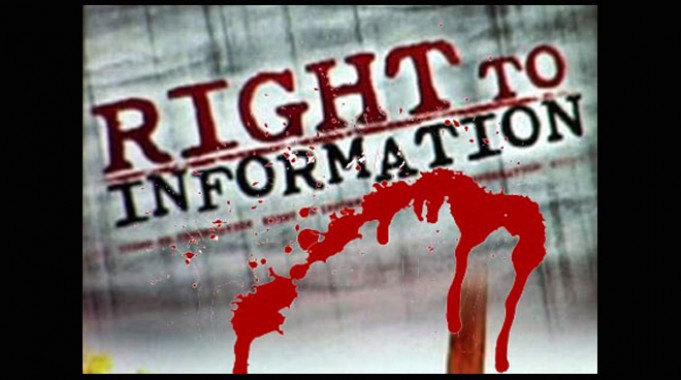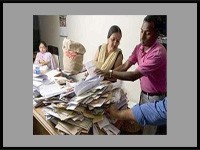Blood on the anniversary
The Right to Information Act came into force on October 12, 2005. Last week people across the country observed eight years of this Act in various ways. But as if to remind us of the price that has been paid for the privilege this act confers, the same week saw yet another murder of an RTI activist. Ratansinh Chaudhary was murdered on October 17 in Garamdi village in Suigamtaluka of Banaskantha district, Gujarat.
He was helping his friend Harkhabhai Ramjibhai in filing an RTI application to seek information on cash given to the flood affected families in Garamdi and Khatau villages in July. The Times of India reported that the query sought information under "proactive disclosure" by the district and panchayat authorities. The paper quoted a resident of the one of those villages as saying that the RTI reply showed “that people who were not affected by the floods received cash doles worth Rs 55,000 and Rs 90,000 while the actual victims got just Rs 2,500."
Following this disclosure four people of Chaudhary's village apparently accosted him and beat him to death.
Those working on the RTI issue put the deaths so far in ten years at 50, including Chaudhury. The estimates vary from 47 to 50. The Hoot tried very hard to dig up actual recorded deaths with names and came up with only 32. Those who can supplement our list are requested to send us any additional information that they may have.
Our research shows the following year-wise and state-wise break up:
Deaths of activists
Year-wise total number of deaths of RTI activists
|
Year |
No of Deaths |
|
2008 |
2 |
|
2009 |
1 |
|
2010 |
11 |
|
2011 |
6 |
|
2012 |
3 |
|
2013 |
4 |
|
2014 |
2 |
|
2015 |
3 |
Those who died
|
1 |
Lalit Mehta |
2008 |
Civil Engineer |
Jharkhand |
|
2 |
Kameshwar Yadav |
2008 |
Activist associated with CPI(ML) |
Giridh, Jharkhand |
|
3 |
Venkatesh |
2009 |
RTI activist |
Banglore, Karnataka |
|
4 |
Babbu Singh |
2010 |
UP police home guard |
Uttar Pradesh |
|
5 |
V Balasubrmanian |
2010 |
RTI activist |
Kancheepuram, Tamil Nadu |
|
6 |
Arun Sawant |
2010 |
RTI activist |
Thane, Maharshtra |
|
7 |
Vishram Laxman Dodiya |
2010 |
|
Surat, Gujarat |
|
8 |
Satish Shetty |
2010 |
|
Pune, Maharashtra |
|
9 |
Shashidhar Mishra |
2010 |
RTI activist |
Begusarai, Bihar |
|
10 |
Sola RangaRao |
2010 |
RTI activist |
Andhra Pradesh |
|
11 |
Vitthal Gite |
2010 |
a farmer and a flour-mill owner |
Aurangabad, Maharashtra |
|
12 |
Datta Patil |
2010 |
Farmer |
Kolhapur, Maharashtra |
|
13 |
Amit Jethwa |
2010 |
|
Ahmedabad, Gujarat |
|
14 |
Ramdas Patil Ghadegaonkar |
2010 |
Milkman |
Nanded, Maharashtra |
|
15 |
Amit Kapasia |
2011 |
Surat-based builder |
Surat, Gujarat |
|
16 |
Shela Masood |
2011 |
Environmentalist |
Madhya Pradesh |
|
17 |
Niyamat Ansari |
2011 |
NREGA activist |
Jharkhand |
|
18 |
Nadeem Saiyed |
2011 |
RTI activist |
Ahmdebad, Gujarat |
|
19 |
Ram Vilas Singh |
2011 |
Panchayatsamiti member |
Bihar |
|
20 |
Jabbardan Gadhvi |
2011 |
RTI activist |
Gujarat |
|
21 |
Rajesh Yadav |
2012 |
RTI activist |
Bihar |
|
22 |
Premnath Jha |
2012 |
RTI activist |
Mumbai |
|
23 |
S Bhuvaneswaran |
2012 |
|
Kolathur, Tamil Nadu |
|
24 |
VasudevaAdiga |
2013 |
RTI activist |
Karnataka |
|
25 |
Ram Kumar |
2013 |
Lawyer |
Muzaffarpur, Bihar |
|
26 |
Shimbu Ram Bishnoi |
2013 |
RTI activist |
Jodhpur, Rajasthan |
|
27 |
Abrar Shaikh |
2013 |
Shop Owner |
Uttar Pradesh |
|
28 |
Rajesh Suri |
2014 |
Lawyer |
Dehradun, Uttarakhand |
|
29 |
Sanjay Tyagi |
2014 |
RTI Activist |
Merrut, UP |
|
30 |
Guru Prasad Mishra |
2015 |
RTI activist and member of Aam Aadmi Party |
Uttar Pradesh |
|
31 |
Jawahar Lal Tiwary |
2015 |
RTI activist |
Muzaffarpur, Bihar |
|
32 |
Ratansinh Chaudhary |
2015 |
RTI activist |
Gujarat |
They are the martyrs whose killings underscore the powerful potential of the Right to Information Act to expose wrong doing at every level.








